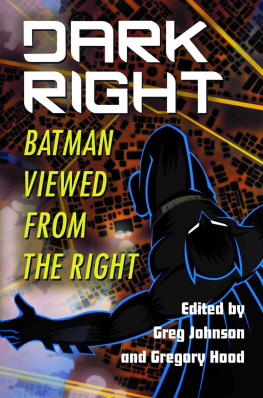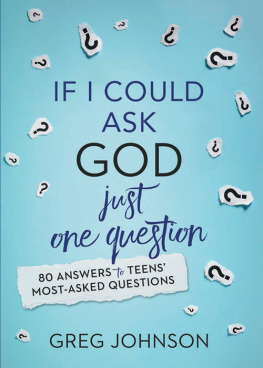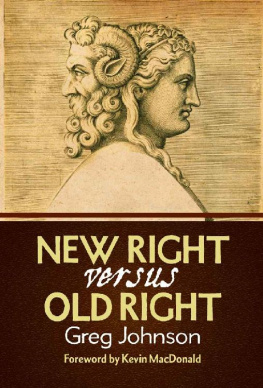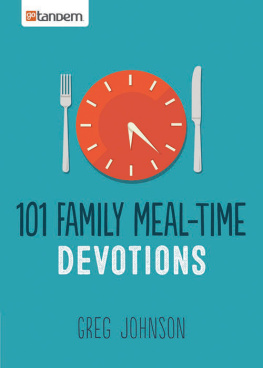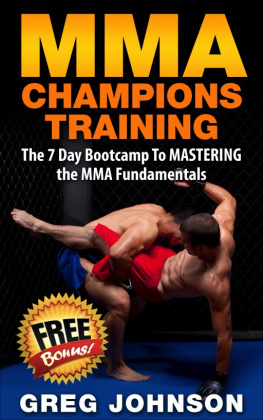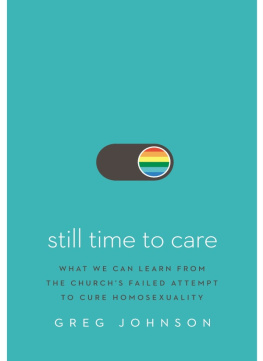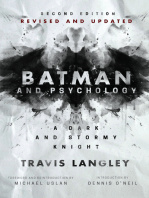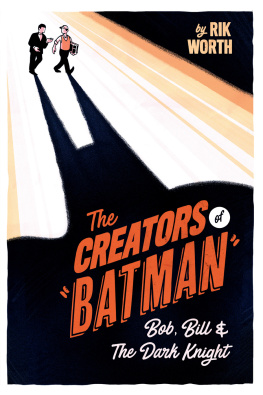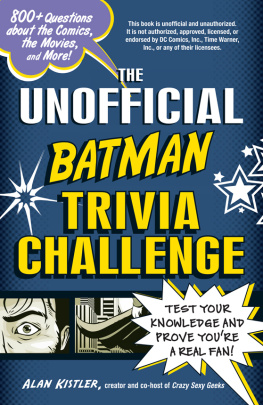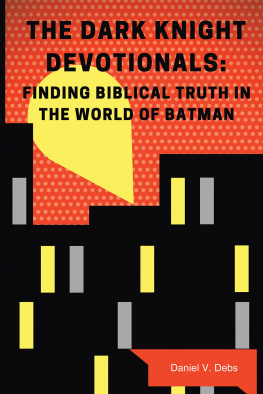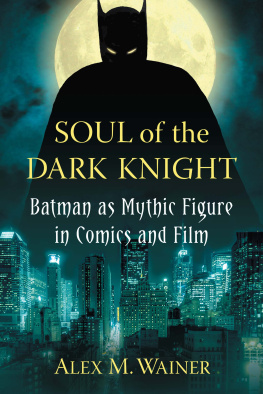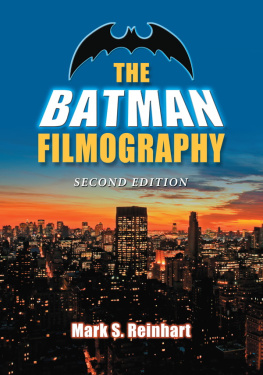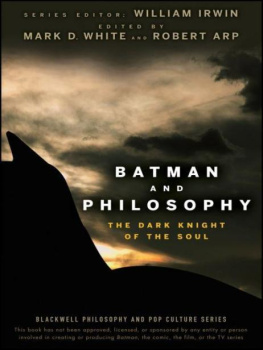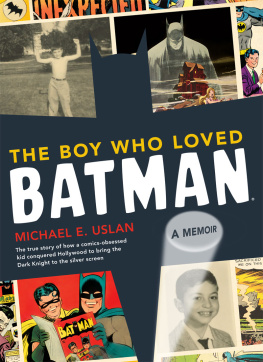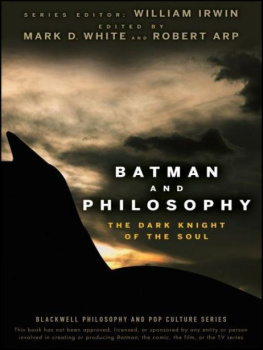D ARK R IGHT
B ATMAN V IEWED F ROM
THE R IGHT
Edited by
G REG J OHNSON
&
G REGORY H OOD
Counter-Currents Publishing Ltd.
San Francisco
2018
Copyright 2018 by Counter-Currents Publishing
All rights reserved
Cover image by Nathan Malone
Cover design by Kevin I. Slaughter
Published in the United States by
C OUNTER- C URRENTS P UBLISHING L TD.
P.O. Box 22638
San Francisco, CA 94122
USA
http://www.counter-currents.com/
Hardcover ISBN: 978-1-940933-50-4
Paperback ISBN: 978-1-940933-51-1
E-book ISBN: 978-1-940933-52-8
Library of Congress Cataloging-in-Publication Data
Names: Johnson, Greg, 1971- editor. | Hood, Gregory, 1980- editor.
Title: Dark right : Batman viewed from the right / edited by Greg Johnson &
Gregory Hood.
Description: San Francisco : Counter-Currents Publishing Ltd., 2018. |
Includes bibliographical references and index.
Identifiers: LCCN 2017056694 (print) | LCCN 2018000090 (ebook) | ISBN
9781940933528 (e-book) | ISBN 9781940933504 (hardcover : alk. paper) |
ISBN 9781940933511 (pbk. : alk. paper)
Subjects: LCSH: Batman films--History and criticism. | Motion
pictures--Political aspects--United States. | Batman (Fictitious
character)--Political aspects. | Batman (Fictitious character)--Social
aspects. | Comic books, strips, etc.--United States--History and
criticism. | Conservatism in literature. | Batman (Comic strip)--Political
aspects.
Classification: LCC PN1995.9.B34 (ebook) | LCC PN1995.9.B34 D37 2017 (print)
| DDC 791.43/651--dc23
LC record available at https://lccn.loc.gov/2017056694
C ONTENTS
T HE D ARK K NIGHT T RILOGY
B ATMAN VS. S UPERMAN
Comics & Graphic Novels
T IM B URTONS B ATMAN M OVIES
W HY ARE Y OU P EOPLE H ERE?
E DITORS I NTRODUCTION
Sometimes, an idea contains within itself the seeds of its own subversion. Sometimes, so can a superhero.
Globalism necessarily requires the eradication of all organic cultures, traditions, and identities. However, deracinating mankind obviously creates a void. Even the most atomized individual desires some kind of a mythos, some image of the transcendent and that which is above. In a world (as the trailer voice guy would intone) where culture has been replaced by consumerism, where God is dead and reality is experienced on a screen, the closest glimpse most people have of the sublime is a superhero.
Superheroes are archetypes by which Consumerist Man interprets his reality. Sometimes, as in the case of Thor, a modern superhero is literally the cheapened, commodified, bastardized version of what entire peoples once adored as gods. Yet no superhero, no archetype, is quite so complex and yet so popular as Batman.
What makes Batman so appealing is that he is not really a superhero in the classic sense. He is not an alien, a god, or the recipient of special powers from a freak accident. He is an ordinary man who has transformed himself into something greater. The Christopher Nolan trilogy emphasizes this characteristic of Batman. As Bruce Waynes mentor cum nemesis Ras al Ghul counsels, If you make yourself more than just a man, if you devote yourself to an ideal, and if they cant stop you, then you become something else entirely... legend.
And because in theory, anyone can choose to undertake this transformation, Batman can outlive Bruce Wayne himself. As Wayne tells Officer John Robin Blake in The Dark Knight Rises , The idea was to be a symbol, Batman could be anybody.
Or can it? Bruce Wayne is, after all, no ordinary man. As the mob boss Falcone sneers, Youre Bruce Wayne, the prince of Gotham, youd have to go a thousand miles to meet someone who didnt know your name! Wayne has all but unlimited financial resources and social connections. His butler and assistant Alfred Pennyworth is a veteran of the British SAS. His ownership of Wayne Enterprises gives him access to weapons and technology far superior to anything the Gotham police possess. Its true anyone can be Batman only in the same way anyone can be a billionaire.
Yet even with all of Bruce Waynes advantages, even with the catalyst of his parents murder, he would not have become Batman without the intervention of an Order. At least in the Nolan trilogy, the same institution which shaped Batman is his greatest foe, the League of Shadows. The League takes its values not from American capitalism or Thomas Waynes vague noblesse oblige but a sense of a cosmic order, a desire to pursue true justice. When we first find Bruce Wayne in Batman Begins, he is truly lost, uselessly brawling with common criminals in a desperate quest for meaning. Ras al Ghul rescues him from what surely would have been a short, pointless life, offering him a path. After obtaining a blue flower, a symbol of trial similar to the white Edelwei the German Gebirgsjger use to this day, Wayne is initiated in a quasi-mystical fashion. He will serve True Justice, by destroying Gotham.
Yet Wayne shies away at this critical moment. He refuses to take the life of a murderer, saying he should be tried in a court. Ras al Ghul protests, asking, rightly, why trust should be placed in corrupt bureaucrats as a credible source of authority. Wayne does not answer at the time, but the rest of Nolans Dark Knight Trilogy, and the entire Batman mythos more broadly, is an answer to that question.
Underneath the corruption and crime, there is an inherent goodness to the people of Gotham city. If the terror under which they live can be lifted, the people will redeem their city. Wayne, reborn as Batman, will transgress the law in order to restore the law, at the price of never being welcomed back into the society he saves, like John Waynes character in The Searchers .
The spectacular villains Batman battles over the course of the seriesRas al Ghul, Scarecrow, the Joker, Baneconceal the reality that the source of corruption the Caped Crusader is fighting is simply the mafia. Gotham is a corrupt town, where justice can be bought and where police are inseparable from criminals. Like a revolutionary who embraces propaganda of the deed, Batmans inhuman appearance and mythical reputation is designed to shock the common people of Gotham into anger against the rather mundane corruption which plagues it.
The point of Batman is to achieve a world where Batman is no longer necessary. This is why Batmans first ally is James Gordon, a rare honest cop on the beat (albeit one who wont rat on his corrupt colleagues). This is why Bruce Wayne thinks his mission is complete with the rise of Harvey Dent.
But as the Joker tells Batman in The Dark Knight, Youve changed things. You cant go back to the way things used to be, to the mundane, once youve introduced the extraordinary and the heroic. If law and order must be represented by the superhuman, so must villainy must be represented by the demonic. Even though Batman initially emerged to combat organized crime, the syndicate which ruled Gotham at the beginning of the series is practically irrelevant throughout the trilogy except as background.
Ultimately, Nolans trilogy is a mediation on the nature of civic order. In the first film, Batman Begins, Bruce Wayne is transformed by the League of Shadows into Batman, but rejects the Leagues Traditionalist vision of True Justice in favor of a reformist approach. Like his father, Bruce Wayne wants to save Gotham, not see it brought to destruction in order to serve balance. Batmans triumph over Ras al Ghul suggests this is possible, as Gordon rises in power at the police department and ordinary people begin stepping forward to fight corruption.
In The Dark Knight, Batmans theory is challenged by the Joker, who begins tearing apart Gothams power structure from the inside. Instead of corruption, the Joker brings chaos, which, though terrifying, is also enticing. And you know the thing about chaosits fair, as he puts it.
Next page
